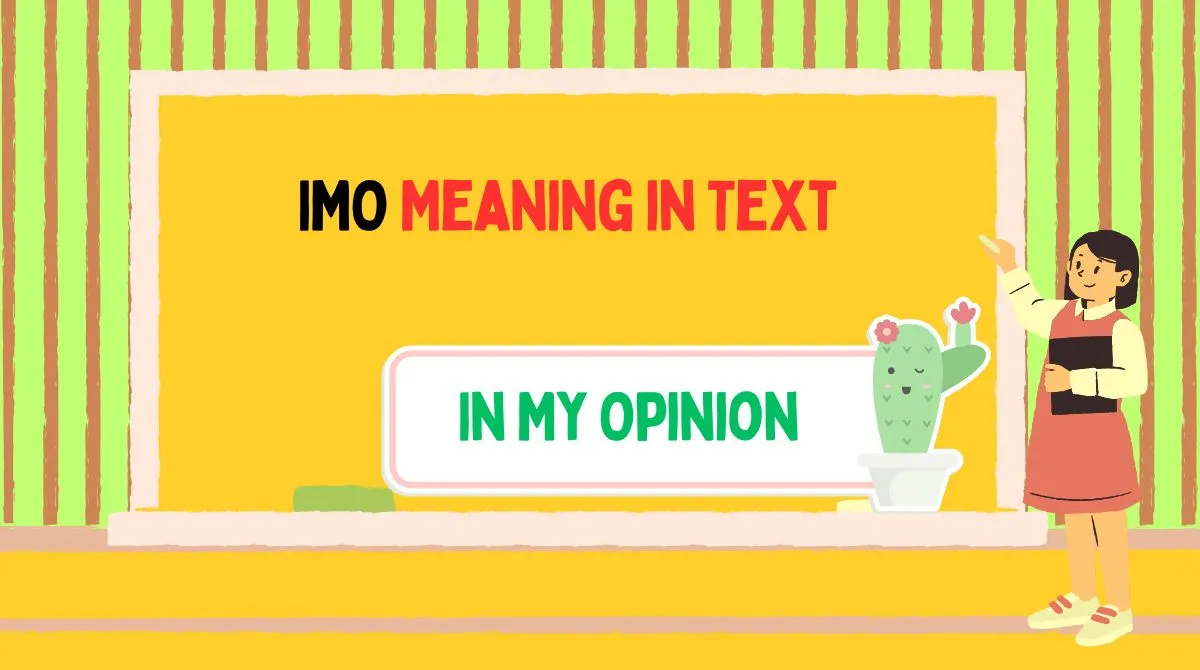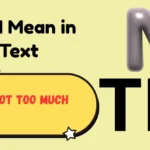In the fast-moving world of texting and online communication, acronyms rule the game. You’ve probably seen IMO pop up in group chats, social media posts, or even quick workplace messages.
But what does IMO mean in text, and how should you use it?
This guide breaks it all down. We’ll explore its meaning, history, when to use it, when to avoid it, smart alternatives, real-world examples, and even a decision-making framework to help you pick the right words for the right moment.
What Does “IMO” Mean in Text?
At its core, IMO stands for “In My Opinion.”
It’s one of the oldest and most widely used internet acronyms. You’ll see it in text messages, forums, Reddit threads, Twitter (now X), and comment sections.
Here’s the gist:
- Meaning: IMO = In My Opinion
- Tone: Casual, conversational, often quick and direct
- Purpose: To signal that what follows is your personal perspective, not a fact
A Quick History
IMO traces back to the early days of the internet—Usenet groups and online forums in the 1980s and 1990s. People needed a shorthand to soften statements and make it clear they were just sharing a personal thought, not a universal truth.
It stuck around because it’s short, easy to type, and instantly recognizable. Even in 2025, it remains one of the top-used internet acronyms.
IMO vs. IMHO
Many people confuse IMO with IMHO, which means In My Humble Opinion.
- IMO = direct, neutral, sometimes blunt
- IMHO = softer, more polite, often used to avoid sounding arrogant
Think of it like this:
- Texting your best friend: “IMO, that movie was boring.”
- Posting in a forum: “IMHO, the book is better than the movie adaptation.”
When to Use “IMO”
The beauty of IMO lies in its informality. It’s perfect when you want to quickly express your take without overexplaining.
Here are the best scenarios to use it:
- Casual texting with friends
- Example: “IMO, pizza tastes better cold the next morning.”
- Social media posts or comments
- Example: “IMO, this is Taylor Swift’s best album yet.”
- Friendly debates online
- Example: “IMO, Marvel movies peaked with Endgame.”
- Gaming chats or community discussions
- Example: “IMO, this character is underrated.”
In these contexts, IMO signals that you’re sharing a personal take, not trying to start an argument.
When Not to Use “IMO”
Not every setting welcomes acronyms. Sometimes, IMO can feel too casual or even dismissive.
Here’s when you should avoid it:
- Professional Emails or Reports
- Writing to a client or boss requires formality. “IMO” may look careless.
- Academic or Research Discussions
- Using slang in scholarly contexts weakens credibility.
- Serious or Sensitive Topics
- For issues like health, politics, or personal struggles, “IMO” can feel flippant.
- Cross-Cultural or Generational Gaps
- Older readers or non-native speakers may not understand “IMO,” leading to confusion.
Example Misstep:
Sending your manager: “IMO, this plan won’t work.”
Better: “From my perspective, this plan may face challenges in execution.”
Why Consider Alternatives to “IMO”?
Using IMO all the time can make your communication feel repetitive or even unprofessional. Alternatives give you more control over tone and allow you to match the context.
Here are three reasons to switch it up:
- Tone Management – “IMO” can sound blunt; alternatives can sound softer or more respectful.
- Professionalism – In emails, meetings, or LinkedIn posts, full phrases are more polished.
- Clarity – Longer alternatives let you emphasize your point with nuance.
Best Alternatives to “IMO” (Grouped by Context)
Different situations call for different phrasings. Here’s a categorized breakdown with examples.
Polite & Professional Alternatives
| Alternative Phrase | Example in Use | Why It Works |
|---|---|---|
| I believe… | “I believe this strategy could improve sales.” | Strong yet polite |
| From my perspective… | “From my perspective, teamwork boosted results.” | Emphasizes subjectivity |
| My understanding is… | “My understanding is that the deadline is next week.” | Shows thoughtfulness |
| To the best of my judgment… | “To the best of my judgment, this design will attract users.” | Formal and careful |
Friendly & Conversational Alternatives
| Alternative Phrase | Example in Use | Why It Works |
|---|---|---|
| Personally, I think… | “Personally, I think tacos beat burgers.” | Warm and relatable |
| As I see it… | “As I see it, the movie dragged in the middle.” | Light but clear |
| It seems to me that… | “It seems to me that summer flies by too fast.” | Gentle and soft |
| To me… | “To me, fall is the best season.” | Casual and simple |
Persuasive & Confident Alternatives
| Alternative Phrase | Example in Use | Why It Works |
|---|---|---|
| One could argue that… | “One could argue that AI is reshaping education.” | Neutral yet strong |
| I would argue that… | “I would argue that quality matters more than speed.” | Firm and assertive |
| It’s my belief that… | “It’s my belief that honesty builds trust.” | Formal conviction |
| In my experience… | “In my experience, consistency beats intensity.” | Adds authority |
Tone Matters: Picking the Right Phrase
Words aren’t just about meaning—they carry tone. Choosing the wrong one can send the wrong signal.
- Professional Setting Example (Email)
- Better: “From my perspective, we should extend the timeline.”
- Not ideal: “IMO, we should extend the timeline.”
- Friendly Group Chat Example
- Perfect: “Personally, I think this meme wins the week 😂.”
- Too stiff: “To the best of my judgment, this meme wins.”
Tone shapes how your message is received. Always match the phrase to the context.
Examples in Action: Rewriting “IMO”
Here are sentences rewritten without “IMO,” showing how alternatives create different impressions:
- Original:“IMO, pineapple on pizza is awesome.”
- Alternative 1: “Personally, I think pineapple on pizza is awesome.”
- Alternative 2: “From my perspective, pineapple makes pizza unique.”
- Alternative 3: “One could argue that pineapple balances the flavors.”
- Original:“IMO, this project won’t succeed.”
- Alternative 1: “I believe this project will face challenges.”
- Alternative 2: “It seems to me that this project has risks.”
- Alternative 3: “In my experience, similar projects struggled.”
Notice how each variation changes the tone while keeping the message.
Quick Guide: How to Choose the Best Alternative
Here’s a decision-making checklist you can use:
✅ Know Your Audience – Friends? Boss? Social followers?
✅ Consider the Platform – Email, Slack, text, or X?
✅ Match Emotional Tone – Lighthearted, serious, persuasive?
✅ Clarify Your Goal – Do you want to share, persuade, soften, or suggest?
Case Study:
- A manager sending feedback to a team: “From my perspective, we could improve this process.”
- A gamer in Discord chat: “Personally, I think this map is overrated.”
- A student in an essay: “In my experience, studying in groups boosts retention.”
The right phrase depends on the right situation.
Related Acronyms You Might See
IMO often travels in a pack with other common acronyms. Here’s a quick cheat sheet:
| Acronym | Meaning | Example Use |
|---|---|---|
| IMHO | In My Humble Opinion | “IMHO, cats are easier pets.” |
| TBH | To Be Honest | “TBH, I don’t like spicy food.” |
| IDK | I Don’t Know | “IDK what to wear tonight.” |
| FYI | For Your Information | “FYI, the meeting moved to 3 PM.” |
| BRB | Be Right Back | “BRB, grabbing coffee.” |
| SMH | Shaking My Head | “SMH, I forgot my keys again.” |
Knowing these makes you quicker and clearer in online communication.
🔥 FAQs About “IMO” in Text
What does IMO mean in text?
IMO means “In My Opinion.” It’s used to show that what follows is your personal viewpoint, not a fact.
What is the difference between IMO and IMHO?
IMO means In My Opinion, while IMHO means In My Humble Opinion. The second one sounds more polite and humble.
Is IMO professional to use in emails?
Not really. IMO is too casual for business emails. Use alternatives like “I believe” or “From my perspective.”
Where can I use IMO?
Use IMO in casual settings—texting friends, social media comments, online discussions, or gaming chats.
What are polite alternatives to IMO?
Polite alternatives include “I believe,” “From my perspective,” and “It seems to me that.” These work better in professional or formal contexts.
Why should I avoid overusing IMO?
Overusing IMO can make you sound blunt or repetitive. Using alternatives gives your message more clarity, tone, and professionalism.
Final Word: Make Your Opinion Count—Smartly
So, what does IMO mean in text? It’s a simple shorthand for “In My Opinion.” While it’s perfect for casual chats and online banter, it’s not always the right fit.
Smart communicators know when to use it, when to skip it, and how to swap it with polished alternatives. By mastering alternatives like “I believe…” or “In my experience…”, you’ll not only sound clearer but also more thoughtful and adaptable.
💡 Remember: The words you choose shape how your opinion lands. Whether you’re texting a friend, commenting on social media, or writing an email, make your opinion count—smartly.










